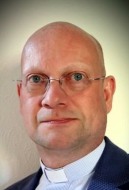St Petri 1710-2010 – The 300th Anniversary Celebration Volume
At first sight this is an unlikely book to review. But it left quite an impression on me when I read it recently. It is the story of how the Lutheran church of St Peter in St Petersburg first grew up, fought back later against severe adversity only to flourish once again today.
Some 300 years ago Czar Peter the Great was intent on reform to lift Russia out of its backward state for which he encouraged the immigration of skilled foreign workers. He founded the city of St Petersburg where a large expatriate German community grew up in a cosmopolitan city. With the blessing of the Czar they set about establishing a Lutheran church which flourished and by 1833 they occupied a grand church in a prime site in the city centre. But they did not just build the church, they were much concerned too about the health and welfare of the surrounding community, for which they built a welfare centre, a huge orphanage, a school and a residence for the poor. Given the condition of Russia at the time, the need must have been enormous.
Sadly all this counted for nothing a century later when the communists came to power. During the Stalinist purges of the 1930's the church was suppressed and most tragically of all, the two pastors together with several church leaders were seized and shot. The building itself fell into disrepair, only to be requisitioned after the war and turned into a public swimming pool.
When the USSR disintegrated 50 years later, the restrictions on churches were relaxed and the Lutheran community in the city began to regroup. They met at first in another former Lutheran church, St Ann's, which had been turned into a cinema but which was secured for church use on Sundays. When the swimming pool in St Peter's church closed in 1992, the Lutherans were able to take possession of that building again. The day after the pool was drained, they held their first service of the new era standing around the empty pool. An enormous effort was entailed in restoring the church and it was finally reconsecrated in 1997. Today it is the hub of a newly flourishing church community, much involved as before in the welfare of its neighbourhood.
But a further blow struck the Lutherans soon afterwards. When the cinema which had operated in the former St Ann's church closed down, the empty building was taken over without authorisation by a night club. Although the Lutherans finally managed to evict the night club and gain possession of the premises, there was an arson attack and the building was burned out. Undaunted, the churches fought back and raised the large sum of money needed to restore their building.
The story is all the more effective for being told in a terse, matter-of-fact manner, well illustrated with contemporary pictures, not a hint of self pity or triumphalism despite all they suffered and achieved. We have faced nothing like it in the churches here. One can only admire their courage and determination.
David Tidy
“Non-believers outnumber the faithful by widest margin yet” So shout the newspaper headlines. Faith is apparently on the decline. Churches are closing all over the place. The headlines come from figures in the recent British Social Attitudes Survey which show that the number of people who claim to have “no religion” now outnumbers those who do claim to have a religion. So is religion becoming extinct? Are religious folk an endangered species? Let's look a bit closer at the survey figures.
The apparent big decline in religion has actually been among those who claim Anglican affiliation or “C. of E.” Since the year 2000 the overall number of such people has dropped from 30% to 15%, and this almost matches the increase in the “no religion” group. The “C. of E.” link is still quite high for older people, but among the young there has been a major drop, with only 3% now professing an attachment. No longer does the quip apply “I'm not religious, I'm C.of E.” One is more likely to encounter the “spiritual not religious” tag, perhaps indicating disillusion with organised religion. In general there has been a loss of nominal attachment to a religion, a change of the cultural default position from “religion” to “no religion”. People no longer opt out, they opt in instead. The actively anti-religious are only a small minority, most are just indifferent, seeing religion as irrelevant to their lives.
But are people in themselves really becoming less religious? Probably not, surprisingly. It all depends on how you ask the question. Instead of being asked about their religion, if people are asked about how religious they are, a different picture emerges. According to a recent YouGov survey, in every age group from the young to the old around 60% of people consider themselves “non-religious”, about 30% are“somewhat religious” while only 5-15% say they are “very religious”.There is no progressive change from the old to the young. It looks as if it is part of one's make-up and the actual proportion of non-religious people in the population is not thought to have changed much over the centuries.
How far is all this reflected in active church membership? It now stands at just 9%, interestingly very close to the proportion of “very religious” people in the population. Some 30 years ago the figure was 14% so it has certainly been dropping, but will it drop still further or has it consolidated at a hard core of “very religious” people? Time will obviously tell, but there are early signs of a change of direction. There is increasing public interest in religious issues, some would even discern a growing hunger for the spiritual. While certain denominations appear to be experiencing continuing loss, others are advancing steadily. Attendance at cathedrals is known to be increasing, some churches have achieved significant growth in attendance, even large increases at times. Perhaps Matthew Arnold's “melancholy, long withdrawing roar” of the “Sea of Faith” is coming to an end and the ebb tide has started to turn to the flood, despite those gloomy prognostications from the journalists.
What is it that makes some churches grow today while others are still shrinking?
How can Trinity ensure it is part of the flood tide, not the ebb tide?
David Tidy
Do you follow the saints' days? I don't normally, but one appeared recently in a story from Germany which happened to catch my eye. The story was about a crime committed several centuries ago, allegedly by three Swedish soldiers who had decamped from their army and wanted to get back home across the Baltic to Sweden. They were said to have gained entry to a local manor house dressed as “Martinsbettler” where they proceeded to murder the occupants, rifle through the contents and escape in a yacht stolen from the estate.
Just what was a “Martinsbettler” I wondered. The word means “St Martin's beggars”, and it turns out that it was the local custom to give alms to beggars on St Martin's day in commemoration of St Martin. St Martin was reputedly a soldier in the Roman army who was riding his horse one day in a snowstorm when he saw a poor beggar with no coat. He promptly cut his own cloak in two with his sword and gave half of it to the beggar. That night he had a dream that Jesus came to him wearing the half of his cloak he had given to the beggar. He was so moved that he left the army, got baptised, went into the church and eventually became bishop of Tours. He died in 397 AD and his funeral was on November 11th, a date which is celebrated as St Martin's Day or Martinmas, the occasion in the church calendar when the giving of alms to the poor is specially fostered.
It became a significant occasion in the secular calendar too, marking the end of the agricultural year with the harvest all gathered in, it was when labourers came to the end of their contracts and farmers would be hiring again for the forthcoming year. It became a celebration of the bounty of the earth, a sort of mini-carnival with lantern-lit processions, bonfires, geese for supper (if you could afford them), all washed down by the first new wines of the season.
Those customs have completely died out here although not so much abroad. In Britain November 11th has been taken over as Remembrance Day and the former St Martin's Day merrymaking has been eclipsed by other events such as Harvest festival, Hallowe'en or Bonfire Night By contrast some old St Martin's Day traditions live on in parts of Germany, uninfluenced by Bonfire Night which is peculiarly British or Hallowe'en which is a relatively recent import and not necessarily popular with all Germans. Furthermore the German Volkstrauertag, the People's Day of Mourning, commemorating those from every country who have died in armed conflict or from violent oppression, falls not on St Martins Day as in Britain but on the second Sunday before Advent.
Have we lost something in Britain? Maybe at this time year there is a case for reviving the celebration of the good St Martin as a benefactor of those in need, if not with all the merrymaking that once went with it.
David Tidy
Book Review
George Fox – the Founder of the Quakers
Jean Hatton 2007 407pp
George Fox lived in the turbulent times of the 17th Century, times which have some uncanny resonances with our own time. The country was deeply split, with Royalists and Parliamentarians in conflict, there was tension between the power of Parliament and the the royal prerogative claimed by the King, often in conflict with the of parliament. Mistrust was widespread. There was paranoia about unwanted influences from Europe, which it was alleged sought to subvert the established protestant religion and bring in catholicism again. In this turmoil any group which dissented from established church order was viewed with great suspicion by the authorities, regardless of whether they were Catholics or Non-conformists. This did not stop many folk joining dissenting groups like the Congregationalists, Baptists and Unitarians, often at great personal cost.
George Fox was a colourful figure in the world of dissent in these times. He was of an imposing stature with a commanding presence and a powerful voice, he could hold the attention of audiences for hours at a time with his impassioned delivery. Urged on by a strong sense of the spiritual, he toured the country endlessly, preaching his belief in the Inner Light prompting self examination as the ultimate guide for one's beliefs and actions. He was deeply versed in the scriptures and quoted them profusely in his sermons, but he rejected all forms of creed and dogma. He did not believe in priests or their “steeplehouses”, he would not swear oaths in court, quoting the words “let your yea be yea and your no be no”, he rejected wars and violence, he refused to pay tithes or honour his social superiors by doffing his hat as all were equal in his eyes, honour was for God alone. He wrote “Walk boldly upon the world, answering that of God in all men”
Many were drawn to his teaching and meetings sprang up all over the country where these seekers, or Quakers as they came to be known, would gather every Sunday to worship. They attracted the attention of the authorities and under a variety of laws they were severely persecuted; many were jailed in appalling conditions, Fox had numerous periods of imprisonment himself through which his health suffered badly. Injustices were common, juries could actually be fined for not bringing in the “right” verdict, appeals had to be pursued through byzantine legal structures before there was any chance of relief.
In his decades of travel, preaching and encouragment, he established the Quaker movement which lives on to this day. It is tempting to see liberal theology of the present day as a relatively recent development, yet the story of George Fox is a reminder that it has a much longer pedigree, even if eclipsed later by influential movements like Evangelicalism or Anglo-Catholicism. For today perhaps his most lasting legacy however is religious toleration which was only won shortly before his death, largely prompted by public awareness and discomfiture at the appalling sufferings inflicted on his innocent followers.
David Tidy



